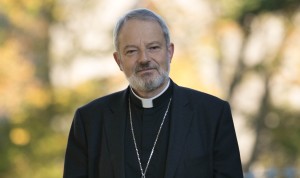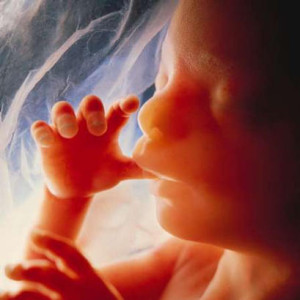
By Cian Molloy - 28 January, 2018

Kevin Doran, Bishop of Elphin
On the eve of the government’s decision to hold a referendum on the eighth amendment, Bishop Kevin Doran of Elphin has warned that ending the constitutional protection of unborn life has serious consequences for all of us.
“If society accepts that one human being has the right to end the life of another, then it is no longer possible to claim the right to life as a fundamental human right for anybody,” says the Bishop, who is chair of the Irish hierarchy’s consultative group on bioethics. “The very same arguments, which are now being used to justify abortion, will be used to justify ending the lives of frail elderly people and people with significant disability.”
Following Taoiseach Leo Varadkar’s announcement that he plans to campaign to ‘liberalise’ Ireland’s abortion laws and Fianna Fáil leader Mícheál Martin’s earlier announcement that he favours allowing ‘abortion on request’ in the first trimester (first three months) of pregnancy, the government is set to decide at tomorrow’s cabinet meeting to hold a referendum on the eighth amendment.
The government is also set to decide tomorrow whether the referendum will call for the simple deletion of Article 40.3.3, known as repeal simpliceter, or whether it will propose a newly worded Article 40.3.3 that might specify particular circumstances when termination of pregnancy would or would not be allowed or that might refer to specific legislation.
“Since the time of the Apostles, the Church has always taught that human life is sacred and has regarded the deliberate taking of innocent human life as gravely sinful,” says Bishop Doran in a pastoral letter to the Elphin diocese published today.
“Modern embryology now makes it clear that there is no conflict between faith and reason. The new human being, which will be born as your baby after nine months, begins at fertilisation. The genetic identity of the new child is already there from the very beginning. Everything else is simply natural development.”
The Bishop notes that in the world of road safety and work safety, there is a growing recognition of the need to protect life and to keep people safe. “Against that background, it is difficult to understand why anyone would suggest that abortion should be legalised,” he says.
“Both Pope John Paul II and Pope Francis have acknowledged that there are many factors which can influence the decision to have an abortion, and that it can be a painful and shattering decision. Both Popes, while insisting that abortion is always gravely sinful, have assured us that God’s mercy is always available to us when we turn to Him. This surely is the correct balance.”
Addressing those who describe the campaign to legalise the deliberate termination of a pregnancy as ‘pro-choice’, Bishop Doran said: “When it comes to ‘the right to choose’, there is a tendency to forget that there is another person involved; a vulnerable person who has no choice and who depends entirely on others for protection. If society accepts that one human being has the right to end the life of another, then it is no longer possible to claim the right to life as a fundamental human right for anybody. A number of EU member states have already legalised euthanasia. I am convinced that if we concede any ground on abortion, the very same arguments which are now being used to justify abortion will be used to justify ending the lives of frail elderly people and people with significant disability. This is the final frontier. If we cross it, there will be no easy way back.”
In response to the recommendation that Article 40.3.3 be removed simpliciter and not replaced with alternate wording, the Bishop said: “The government would be left entirely free to introduce whatever abortion regime it chooses, now or at any time in the future. Promises made before the referendum would not in any sense be binding. What the Committee is asking is that citizens would give the government a blank cheque. I have never been comfortable writing blank cheques!”
The Bishop concludes his pastoral letter with advice to the faithful on how we should respond to this political, moral and ethical challenge.
“I believe that it would help greatly if people who believe in the right to life of the unborn would just talk to their neighbours and friends over a cup of tea or a pint, as they would about sport or politics,” he said. “It is not about debating or being confrontational. At the most basic level, it is just about letting other people see that they are not alone and that it is perfectly reasonable to believe in the right to life.
“People sometimes talk about prayer as if it were the last refuge. I don’t see it that way. In prayer, we ask for hearts that are in tune with the heart of God. If you are uncertain about how to vote or what to do, I encourage you to pray daily for the gift of wisdom, and to allow God’s Spirit to be your guide.”
For spiritual resources on how to respond to this threat to the culture of life, Bishop Doran recommends that people visit the website www.chooselife2018.ie.
In a democracy, we all have our part to play and politics is not just for the politicians, says the Bishop, urging his flock to talk or write to politicians, making it clear that they want them to defend the right to life of the unborn. The Bishop counselled: “Be polite, but make sure they know you are there and they know what you believe.”
Looking ahead, the Bishop said: “Whatever happens in respect of the Constitution, there will continue to be a need to support women, especially women who face challenging circumstances in pregnancy. With that in mind, I am exploring how, beyond the specific activity involved in crisis pregnancy counselling, which is already offered by Cura, we might be able to provide some additional supports which would empower women to choose life, not just for the baby, but for their own sake as well. I would be glad to hear from anyone who has particular expertise or personal experience which might help us to shape this response.”